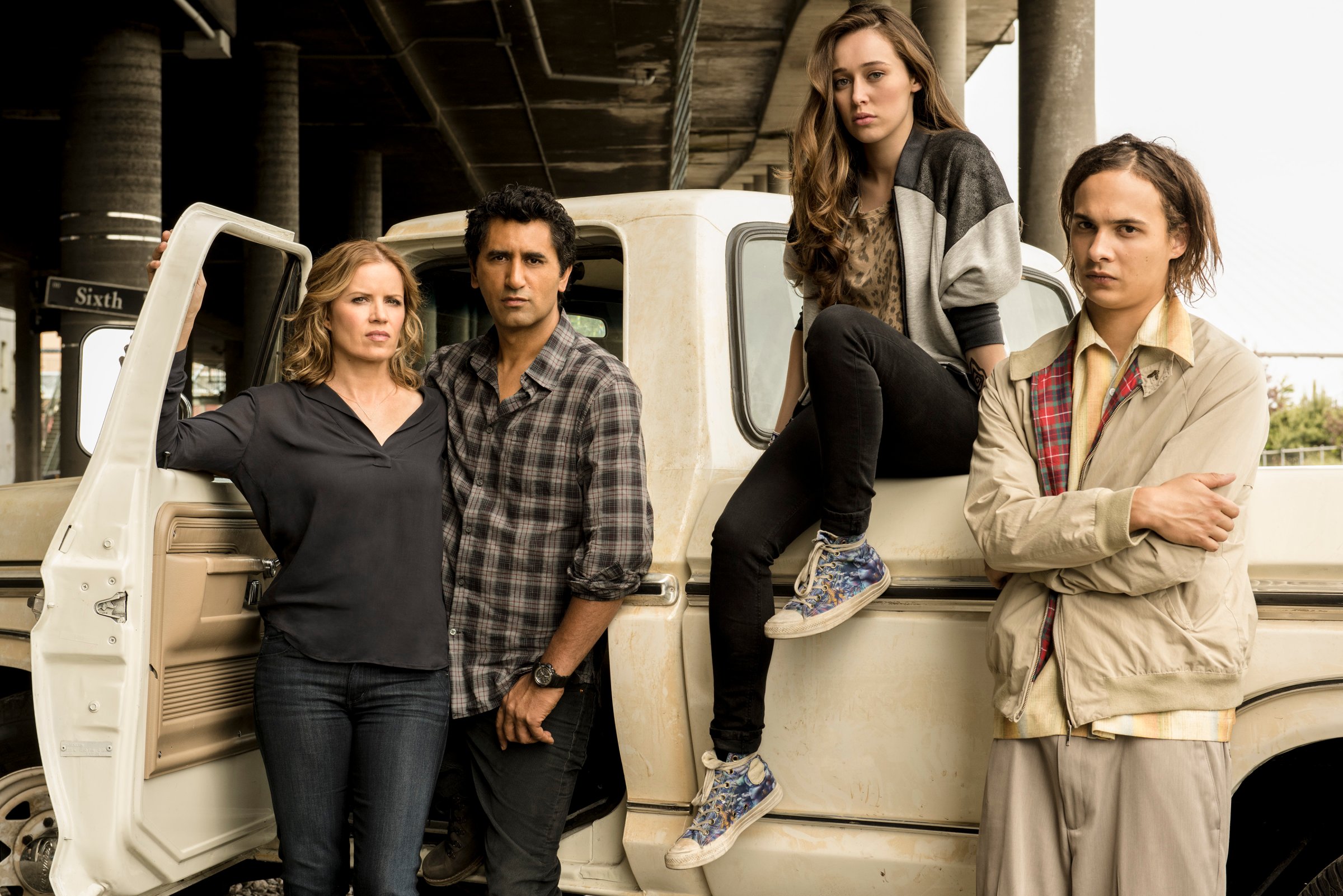
AMC’s Fear the Walking Dead introduced its first family of survivors on last week’s series premiere, in which a blended family struggles to accept that their drug-addict son saw the beginning of humanity’s demise.
From creators Robert Kirkman and Dave Erickson, Fear‘s first season follows that family as they fight to survive the outbreak in Los Angeles. Nick (Frank Dillane) is the first to encounter a member of the undead, but his family, including his guidance counselor mother Madison (Kim Dickens) and her boyfriend Travis (Cliff Curtis), as well as younger sister Alicia (Alycia Debnam-Carey), all thought he was delusional. By the end of the 90-minute pilot, Madison and Travis have seen firsthand that the dead certainly aren’t staying that way and all hell is about to break loose.
The Hollywood Reporter quizzed the cast to find out what they thought their respective characters’ most valuable skills are and whether they have what it takes to survive.
Kim Dickens (Madison)
Most valuable skill set: I think she’s the primal mama bear. What she’s tried to hide or fix about herself is the thing that she has to rely upon to help her. I find that very real because in life, we try to push away the things we think are bad about ourselves and they’re often the things that are the most charming or useful about us. Madison’s pragmatism led her to be able to make very quick decisions. She’s fearless.
Survival odds: All our characters have is the moment. Madison is very human and very real living in East L.A. I don’t think she has the skills to survive. What I think is fascinating about these stories that tap into this theme of survival and morality is how our characters evolve and grow and what they will learn and how they will cope.
Cliff Curtis (Travis)
Most valuable skill set: Clear thinking. Good thinking. A love of what’s good in humanity and fighting for that. He’s not willing to fight for mere survival. He’s got a deeper, more soulful aspect to him than just gross instincts like, “You have to survive.” That’s not enough for Travis. He wants more. Does this man belong in this world? Does he fit? Is there a fit? Do we really need guys who love books and their kids? Is this guy relevant?
Survival odds: I’m trying to work with the creators of the show to define a character that’s not so distinctly one thing or another. I want to warp that middle line. Like, “Maybe he’s not suited for this new world order. Maybe really he’s not willing to become what he needs to become in order to survive. Maybe he’s not a survivalist. Maybe he believes there’s more to life and there’s more than just surviving.” That’s a fascinating gray area, and I want to stay in there as long as possible. I’m interested in staying on that middle path and the whole idea that being masculine doesn’t mean being violent and being powerful for a woman doesn’t mean being masculine. I think there’s fascinating stuff to explore there in terms of male-female relationships. There’s more to life than being a badass.
Frank Dillane (Nick)
Most valuable skill set: The ability to get what he wants. He’s got a good ability to do that. He’s streetwise. I often don’t know if he’s telling the truth or not. He seems to make up his own moral compass. He doesn’t adhere to these social conditions that everyone else does. Homeless people have a different way of seeing the world, and Nick does too. The extent of his resilience surprises me.
Survival odds: If you’re a drug addict, you have one problem: When do I get my fix? When you get your fix, the whole world is beautiful. When you don’t, the whole world is shit. So that single-mindedness is perfect. It’s only life or death. I can’t stay like that forever because it’s too difficult. I think we’ll probably see him overcome that.
Alycia Debnam-Carey (Alicia)
Most valuable skill set: Like Frank said, being streetwise in L.A. The original [series] is very rural, whereas this you have to learn how to deal with people quite quickly.
Survival odds: I think she does have what it takes to survive. She’s had to be quite self-sufficient already at a young age. She’s got that independence to her. She already had a plan set up that she was ready to go through with and get out of this situation that she’s in. That will help her in this new world. She’s in a very vulnerable place: as a teenager, you will be molded quickly. You see the kids develop on the original and they adapt very quickly to how to live in that world, whereas it’s harder for adults. I think Alicia is going through that transition to adult, so she might pick up some primal survival skills more quickly.
This article originally appeared on The Hollywood Reporter
More from The Hollywood Reporter:
More Must-Reads from TIME
- Donald Trump Is TIME's 2024 Person of the Year
- Why We Chose Trump as Person of the Year
- Is Intermittent Fasting Good or Bad for You?
- The 100 Must-Read Books of 2024
- The 20 Best Christmas TV Episodes
- Column: If Optimism Feels Ridiculous Now, Try Hope
- The Future of Climate Action Is Trade Policy
- Merle Bombardieri Is Helping People Make the Baby Decision
Contact us at letters@time.com